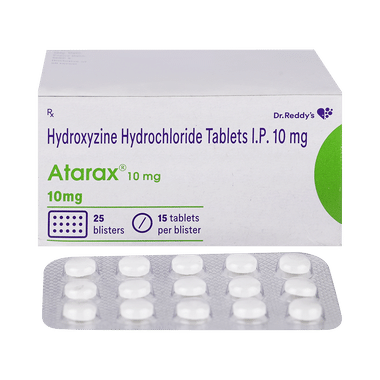-
Dedex 10mg Tablet (Rs.20.63)
Composition: Hydroxyzine (10mg)
-
Conee 10mg Tablet (Rs.14.53)
Composition: Hydroxyzine (10mg)
-
Droxyzine Tablet (Rs.26.25)
Composition: Hydroxyzine (10mg)
-
Alerex 10mg Tablet (Rs.36.75)
Composition: Hydroxyzine (10mg)
-
Alerex 10mg Oral Suspension (Rs.62.81)
Composition: Hydroxyzine (10mg)
-
Livrox 10mg Syrup (Rs.60.94)
Composition: Hydroxyzine (10mg)
-
Histeeze AT 10mg Tablet (Rs.33.69)
Composition: Hydroxyzine (10mg)
-
Hydrovik 10mg Syrup (Rs.60.94)
Composition: Hydroxyzine (10mg)
-
Hydrobal 10 Tablet (Rs.17.81)
Composition: Hydroxyzine (10mg)
-
H-Zin 10 Tablet (Rs.18.75)
Composition: Hydroxyzine (10mg)
All Details About Atarax 10mg Tablet
Find out detailed description, uses, directions of use, side effects, warnings and precautions, frequently asked questions about Atarax 10mg Tablet
Description:
Atarax 10mg Tablet is used to treat symptoms of skin allergy like itching, swelling, and rashes in conditions such as eczema, dermatitis, and psoriasis. It is also used to treat anxiety and helps to relax before or after surgery.Atarax 10mg Tablet should be taken with or without food. Take it exactly as your doctor has prescribed. The dose and how often you take it depend on what you are taking it for. Your doctor will decide how much you need to improve your symptoms. Take it for as long as it is prescribed for you. In case you have missed any doses, take the next dose as soon as you remember it. However, you should never take a double dose.
The most common side effects of this medicine include drowsiness, dizziness, blurred vision, constipation, and dry mouth. If these bother you or appear serious, let your doctor know. There may be ways of reducing or preventing them.
Earlier taking this medicine, let your doctor know if you have heart problems, high blood pressure, or liver or kidney problems. Inform your doctor if you are pregnant or breastfeeding. Your doctor should also know about all other medicines you are taking, as many of these may make this medicine less effective or change the way it works. Generally, it is advised to avoid alcohol while on treatment.
Uses:
- Treatment of Apprehension
- Treatment of Skin conditions with inflammation & itching
Directions For Use:
Take this medicine in the dose and duration as advised by your doctor. Swallow it as a whole. Do not chew, crush or break it. Atarax 10mg Tablet may be taken with or without food, but it is better to take it at a fixed time.Side Effects:
Most side effects do not require any medical attention and disappear as your body adjusts to the medicine. Consult your doctor if they persist or if you’re worried about themOrdinary side effects of Atarax
- Dizziness
- Blurred vision
- Constipation
- Dryness in mouth
Warning & Precautions:
For severe liver impairment patients, Atarax 10mg Tablet is contraindicated.
FAQs:
What is Atarax 10mg Tablet? What is it used for?
Is Atarax 10mg Tablet safe?
How does Atarax 10mg Tablet work for allergies?
Is Atarax 10mg Tablet effective?
Can I stop taking Atarax 10mg Tablet when I feel better?
What should I tell my doctor before starting treatment with Atarax 10mg Tablet?
Written by:
Dr. Lokanish
M.B.B.S.
Reviewed by:
Dr. Sureshbabu Yadav
M.B.B.S., DIP.DIAB, F.R.S.H
Disclaimer:
Getomeds primary intention is to ensure that its consumers get information that is reviewed by experts, accurate, and trustworthy. The information and contents of this website are for informational purposes only. They are not intended to be a substitute for professional medical advice, diagnosis, or treatment. Please seek the advice of your doctor and discuss all of your concerns about any disease or medication. Do not disregard or postpone seeking professional medical advice because of something you read on Getomeds. Our mission is to support, not replace, the doctor-patient relationship.
